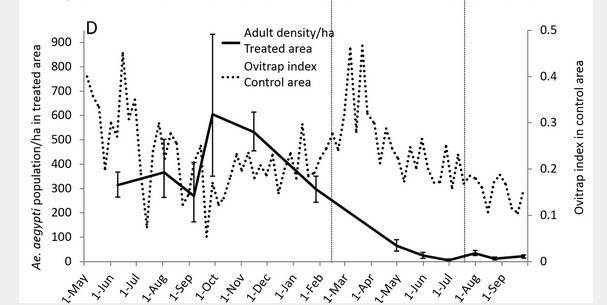| Online: | |
| Visits: | |
| Stories: |

| Story Views | |
| Now: | |
| Last Hour: | |
| Last 24 Hours: | |
| Total: | |
Genetically Engineered Mosquitoes Reduce Dengue Transmitters by 95 Percent – Entomology Today
“The results of a trial of genetically engineered mosquitoes intended to reduce their ability to transmit dengue fever have been published in the journal PLOS Neglected Tropical Diseases.The mosquitoes, commonly known as “Friendly Aedes aegypti” mosqitoes in Brazil where the trial took place, were developed by a company called Oxitec. The results of the trial showed that the numbers of the mosquito (Aedes aegypti) that spreads dengue fever, yellow fever, chikungunya, and zika virus were reduced by more than 90%.” Entomology Today
Author Summary
Dengue is a major mosquito-borne disease, increasing in prevalence and severity; there are no specific drugs or licensed vaccine. It is primarily transmitted by one mosquito species, Aedes aegypti. We released transgenic ‘sterile’ male mosquitoes in Itaberaba, a suburb of Juazeiro, a Brazilian city. Sustained release of these males, whose offspring typically die before adulthood as a consequence of the transgenic modification, strongly suppressed the target wild population—by 80–95% according to different measures. These data are consistent with previous releases in the Cayman Islands, suggesting that differences between the two locations, including the environment or wild mosquito strain, made little difference. Mathematical models suggest that this degree of suppression would be highly effective in preventing epidemic dengue.
See also Carvalho DO, McKemey AR, Garziera L, Lacroix R, Donnelly CA, Alphey L, et al. (2015) Suppression of a Field Population of Aedes aegypti in Brazil by Sustained Release of Transgenic Male Mosquitoes. PLoS Negl Trop Dis 9(7): e0003864. doi:10.1371/journal.pntd.0003864
distribution, and reproduction in any medium, provided the original author and source are credited
Observations from the highlighted report showing GM mosquito release suppresses disease spreading mosquito numbers shown by the solid line.
Source: http://gmopundit.blogspot.com/2015/07/genetically-engineered-mosquitoes.html





